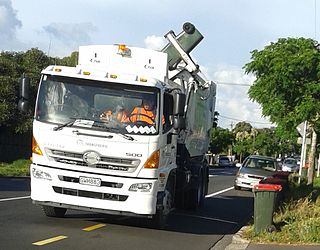
Merseyside is a metropolitan and ceremonial county in North West England, with a population of 1.38 million. It encompasses the metropolitan area centred on both banks of the lower reaches of the Mersey Estuary and comprises five metropolitan boroughs: Knowsley, St Helens, Sefton, Wirral and the city of Liverpool. Merseyside, which was created on 1 April 1974 as a result of the Local Government Act 1972, takes its name from the River Mersey.

Waste management includes the activities and actions required to manage waste from its inception to its final disposal. This includes the collection, transport, treatment and disposal of waste, together with monitoring and regulation of the waste management process and waste-related laws, technologies, economic mechanisms.

A landfill site, also known as a tip, dump, rubbish dump, garbage dump, or dumping ground, is a site for the disposal of waste materials. Landfill is the oldest and most common form of waste disposal, although the systematic burial of the waste with daily, intermediate and final covers only began in the 1940s. In the past, refuse was simply left in piles or thrown into pits; in archeology this is known as a midden.

The Metropolitan Borough of Sefton is a metropolitan borough of Merseyside, England. It was formed on 1 April 1974, by the amalgamation of the county boroughs of Bootle and Southport, the municipal borough of Crosby, the urban districts of Formby and Litherland, and part of West Lancashire Rural District. It consists of a coastal strip of land on the Irish Sea which extends from Southport in the north to Bootle in the south, and an inland part to Maghull in the south-east, bounded by the city of Liverpool to the south, the Metropolitan Borough of Knowsley to the south-east, and West Lancashire to the east.
Merseytravel is the Passenger transport executive and Strategic Transport Advisor for the Liverpool City Region. Responsible for the coordination of public transport in Merseyside, North West England. Merseytravel was established on 1 December 1969 as the Merseyside Passenger Transport Executive. From 1 April 2014 Merseytravel expanded its area of operation from the metropolitan county of Merseyside to also include the Borough of Halton.

The Greater Manchester Waste Disposal Authority (GMWDA) is England’s largest Waste Disposal Authority, responsible for the management and disposal of municipal waste from Greater Manchester. It deals with 1.1 million tonnes of waste produced each year, from approximately 1 million households and population of over 2.27 million in the metropolitan districts of Bolton, Bury, Manchester, Oldham, Rochdale, Salford, Stockport, Tameside and Trafford — though part of Greater Manchester, the Metropolitan Borough of Wigan administers its own waste disposal operations, however they are represented on the authority for administration purposes. The waste comes primarily from household waste collections and 20 Household Waste Recycling Centres (HWRCs) provided and serviced by the GMWDA. It handles around 4% of the nation's municipal waste.

Waste Management, Inc. is an American waste management, comprehensive waste, and environmental services company in North America. Founded in 1968, the company is headquartered in the First City Tower in Houston, Texas.

Sefton Council is the governing body for the Metropolitan Borough of Sefton in the historic county of Lancashire and the ceremonial county of Merseyside, north-western England. The council was under no overall control from the 1980s until 2012 when the Labour Party took control. It is a constituent council of Liverpool City Region Combined Authority.

The Landfill Directive, more formally Council Directive 1999/31/EC of 26 April 1999 is a European Union directive that regulates waste management of landfills in the European Union. It was implemented by its Member States by 16 July 2001.

In 2015, 43.5% of the United Kingdom's municipal waste was recycled, composted or broken down by anaerobic digestion. The majority of recycling undertaken in the United Kingdom is done by statutory authorities, although commercial and industrial waste is chiefly processed by private companies. Local Authorities are responsible for the collection of municipal waste and operate contracts which are usually kerbside collection schemes. The Household Waste Recycling Act 2003 required local authorities in England to provide every household with a separate collection of at least two types of recyclable materials by 2010. Recycling policy is devolved to the administrations of Scotland, Northern Ireland and Wales who set their own targets, but all statistics are reported to Eurostat.
Toronto Solid Waste Management is the municipal service that handles the transfer and disposal of garbage as well as the processing and sale of recyclable materials collected through the blue box program in Toronto, Ontario, Canada. It also coordinates programs to help residents and business reduce their production of waste.

Republic Services, Inc is the second largest provider of non-hazardous solid waste collection, transfer, disposal, recycling, and energy services in the United States, as measured by revenue.

Teesside Energy from Waste plant is a municipal waste incinerator and waste-to-energy power station, which provides 29.2 megawatts (MW) of electricity for the National Grid by burning 390,000 tonnes of household and commercial waste a year. It is located on the River Tees at Haverton Hill, east of Billingham in North East England. Developed and built by NEM, a subsidiary of Northumbrian Water, the initial plant replaced the Portrack Incinerator and opened in 1998. Subsequently the facility became part of SITA, now Suez.

Waste Connections is an North American integrated waste services company that provides waste collection, transfer, disposal and recycling services, primarily of solid waste. It has operations in both the United States and Canada, and has headquarters in The Woodlands, Texas and Vaughan, Ontario. It is the third largest waste management company in North America. Near the end of 2018, the company removed "Inc." from its corporate name. The company is now known simply as "Waste Connections".

The management of waste in New Zealand has become more regulated to reduce associated environmental issues.

Waste management laws govern the transport, treatment, storage, and disposal of all manner of waste, including municipal solid waste, hazardous waste, and nuclear waste, among many other types. Waste laws are generally designed to minimize or eliminate the uncontrolled dispersal of waste materials into the environment in a manner that may cause ecological or biological harm, and include laws designed to reduce the generation of waste and promote or mandate waste recycling. Regulatory efforts include identifying and categorizing waste types and mandating transport, treatment, storage, and disposal practices.

Barnet London Borough Council is the local authority for the London Borough of Barnet in Greater London, England. It is a London borough council, one of 32 within London. Barnet is divided into 21 wards, each electing three councillors.

Wakefield Council, also known as Wakefield Metropolitan District Council is the local authority of the City of Wakefield in West Yorkshire, England. It is a metropolitan district council and provides a full range of local government services including Council Tax billing, libraries, social services, processing planning applications, waste collection and disposal, and it is a local education authority. Wakefield is divided into 21 wards, electing 63 councillors. A third of the council is elected for three of every four years. The council was created by the Local Government Act 1972 and replaced the Wakefield City Council of the County Borough of Wakefield and several other authorities. Since 1974 Wakefield has held borough and city status and from this time would use the full title of the authority on all publications, signage, council vehicle fleet and documents, however from around 2005, like many other local authorities doing so at the time, the authority dropped the full title for the shorter Wakefield Council.
The West London Waste Authority is the statutory body responsible for waste disposal in the London boroughs of Brent, Ealing, Harrow, Hillingdon, Hounslow and Richmond upon Thames. The authority was formed in 1986, taking over functions previously held by the Greater London Council, and is overseen by an elected councillor from each of the boroughs in which it operates.

















